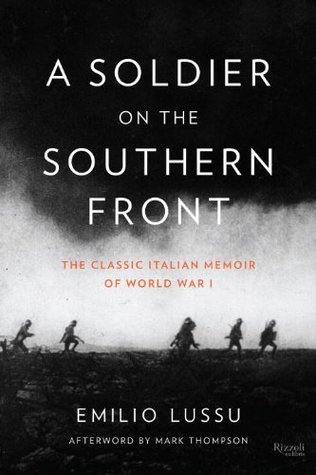
A Soldier on the Southern Front
The Classic Italian Memoir of World War I
- اطلاعات
- نقد و بررسی
- دیدگاه کاربران
نقد و بررسی

February 1, 2014
The recovered memoir of a brave Italian soldier in World War I. A lieutenant in the Sassari brigade of the Italian infantry, Lussu (1890-1975) waited 20 years to publish his memories of World War I in the Asiago Plateau, fighting the Austrian offensive. It is a story of trench warfare in 1916, but more importantly, it is the story of the men who fought and their derision of their commanding officers. They felt the enemy was not the Austrians but rather the men behind them giving orders that could only get them killed. The author's memory is vivid, and the characters demand it. He writes of a general who demanded a different kind of definition of victory--not, "do you have enough supplies?" but a philosophical discussion. Gen. Leone, a pure wacko, demanded men wear body armor he had specially brought. Of course, when he sent them into battle, the armor was absolutely worthless. Another officer couldn't understand why Lussu didn't drink, something everyone in that army did--all day long and especially before a battle. The author writes about a war of maneuver to save lives rather than a war of position that would cost them. Regardless, the fact that they succeeded to take Monte Fior only to abandon it left them mostly in the same position throughout the conflict. These men were surely cannon fodder, and a short mutiny was the precursor to a much more serious revolt. One company abandoned their position in a cave that threatened to collapse, and their leader ordered the execution of every 10th man. Lussu's philosophy of war was born in the days he lived through and wrote about. Like so many soldiers, he was against it, and most readers will be persuaded to agree with him.
COPYRIGHT(2014) Kirkus Reviews, ALL RIGHTS RESERVED.

April 15, 2014
Like Ernest Hemingway, Emilio Lussu (1890-1975) served at the Asiago plateau in Northern Italy. Lussu's plainly written account of the time is a classic in his native country but not well known in the English-speaking world. A 1937 note from the author explains that his book has no thesis except to describe what he saw; that is enough, however, to create a compelling read that enters the mind of a man at the front, exposed daily to terrible scenes and decisions that change who he is. At times Lusso's air of detachment is chilling; in other situations, in humanizing his enemies he is himself humanized. Historical details abound and will be gratifying to readers who want to discover more about the war in Italy; memoir enthusiasts, however, are another target for readers' advisory involving this title. VERDICT A valuable complement to Hemingway's works, this book can also stand on its own as a historical memoir written in a memorable voice.--HV
Copyright 2014 Library Journal, LLC Used with permission.




دیدگاه کاربران